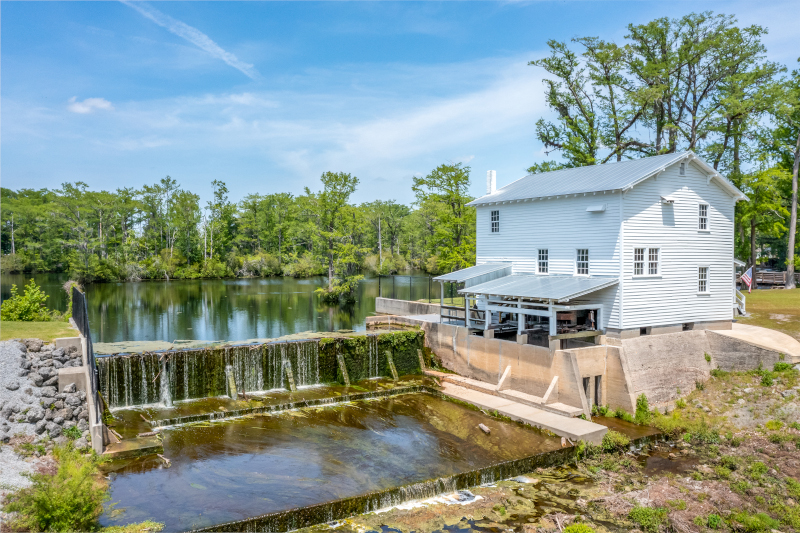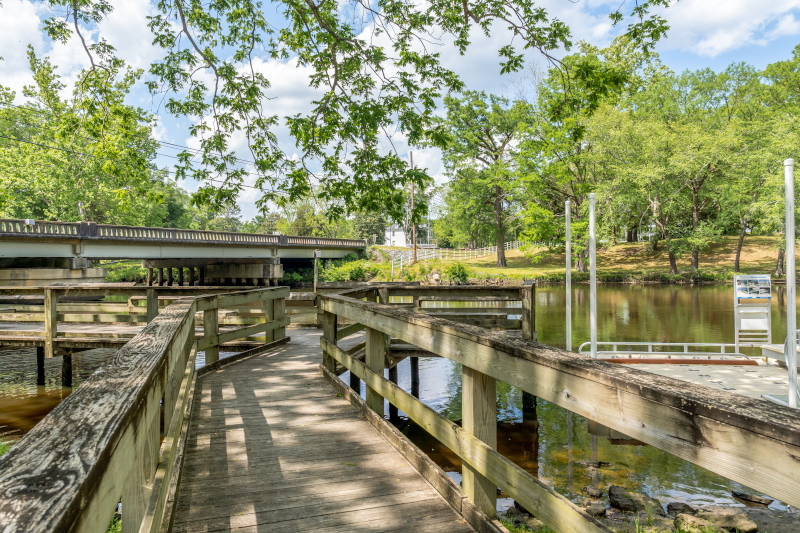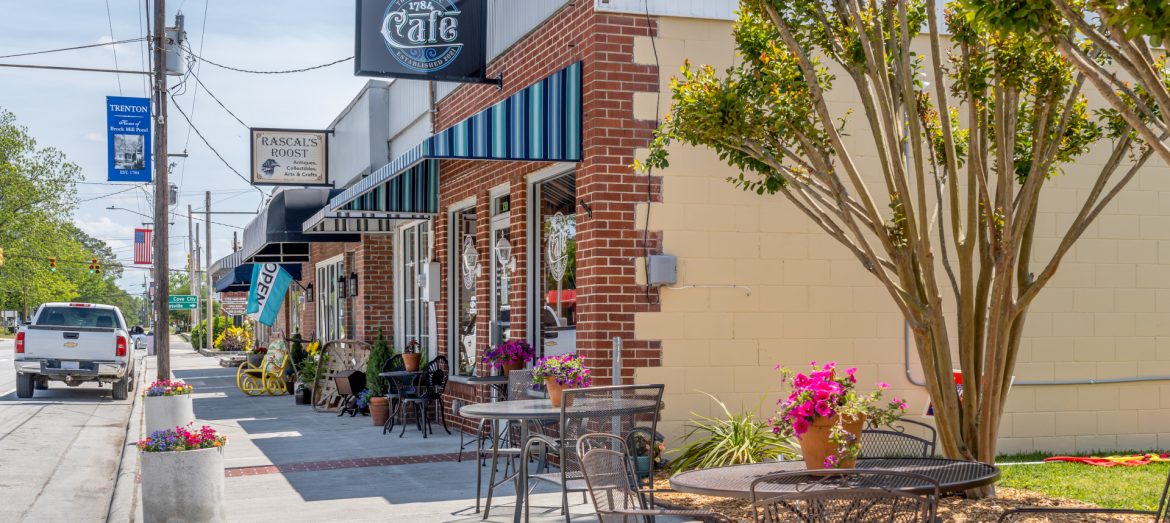Jones County, North Carolina
A new year and new development
With anticipated growth and economic projects in the pipeline, Jones County is perfectly poised
Growth is on the radar for Jones County. With several economic development projects in the works, the county is well-positioned to take on expansion in the new year while it continues to put its community focus first.
Tracing back its origins, Jones County was named in honor of Willie (pronounced Wiley) Jones, an American planter and ardent states’ righter who was influential in culling the location of Raleigh, the new state capital, in 1791. At a time when wealthy landowners among the Revolutionary patriots were generally quite conservative, Willie Jones was an Anti-Federalist and a radical—the man responsible for the State’s refusal to join the Union for a year after its formation (although North Carolina eventually came under the ‘Federal roof’ as the 12th State in the autumn of 1789).
Before the Civil War, Jones County had a cash crop economy. By the 1860s, it had one of the wealthiest plantation economies in the United States. After the war, many of the surviving farms and plantations entered into tenant farming and today, farmers and foresters continue to honor that agricultural heritage with tobacco and lumber as the county’s principal resources.
“It’s still technically very much an agricultural community,” affirms John Bender, Director of Economic Development. “That’s by far our biggest industry here. But we’ve also been working on gaining some new business, and getting some more commercial [activity] going on around here.”
Three industrial parks currently operate in Jones County, one in Pollocksville, one in Maysville, and the county’s own at the edge of Trenton. There are several vacant properties still available for businesses to snatch up, including a building for sale located at 181, Industrial Park Drive, in Trenton. “We’ve got two parcels of land still open, and that building is the first product we’ve had since I started in this position three years ago,” Bender continues. “Our 25,000-square-foot facility would be perfect for some small manufacturing. We’re so close to the coast—you know, 30 minutes from the Emerald Isle beaches—any type of boat manufacturer, or anything dealing with the marine industry, would be a good fit.”
These industrial parks are well-equipped and serviced with a full complement of water, sewer, natural gas, and electricity. “We have wonderful relationships with Duke Energy and Jones-Onslow, which is the local electric co-op,” Bender says. “I’ve even received grants through them that have helped us fund certain opportunities.”
Jones-Onslow powers the industrial park in Trenton, while Duke Energy services the Maysville and Pollocksville facilities. “Those two companies work hard to provide electricity to all of our sites,” Bender continues. “We’d love to see more sewer in certain areas, especially now with the Highway 17 Bypass that just opened two years ago. There’s a lack of infrastructure along there just because it’s so new. But overall, if we can get the right project to come along, we’re confident we can secure the funding and the help through some of our economic development partnerships.”
The County is also looking to grow its people footprint by leveraging its geography and accessibility to maximize its economic well-being.

“We’re centrally located in the eastern North Carolina region,” Bender explains. “We’re right in between three large military bases, consisting of Camp Lejeune in Jacksonville, Cherry Point in Havelock, and Seymour Johnson in Goldsboro. And so, the biggest selling point for Jones County is our location.”
Being a stone’s throw from the beautiful Atlantic Coast and just a two-hour drive from the capital city of Raleigh and the bustling Research Triangle Park translates to a big opportunity for this market. “We’ve got the Future I-42 running through us in addition to the Highway 17 Bypass,” indicates County Manager Kyle Smith. “And so, between the Piedmont and Coastal Plains, you can be anywhere in no time.”
“There’s a lot of growth happening around us, towards us,” offers Bender. “I also think everybody in the region wants to see us grow. We’ve developed some great relationships with the neighboring counties and we’re looking at doing some joint ventures down the road. Hopefully, we’ll be able to market that in the near future.”
At the same time, he recognizes that Jones County is an area prized for its slower pace and intimate community life. “That’s what a lot of people are moving here for,” Bender admits. “There are a lot of folks who are looking to get out here. But due to the farming and, really, the traditional family values that celebrate owning large tracts of land, we, unfortunately, don’t have that many residential properties available. Still, it’s a great place to raise a family and I think you’ll see even more folks wanting to come this way.”
More building inspections and permits being issued are a clear signal that their economy is on the right path, according to Smith. “We’ve put a lot more water taps in, which means more people are getting on our regional water system,” he adds. “Again, it can be hard for those wanting to move here to find a tract of land that’s available, but that’s sort of where we’re at as a county.”
As far as new facilities go, the state-of-the-art K-12 school incorporating Trenton Elementary, Jones Middle, and Jones Senior High schools finished completion in 2019, representing a truly unique initiative for the county. There was also a groundbreaking ceremony in July 2021 for the high school’s new baseball and softball fields. “Being an alumni of the school, a former baseball player, and a son to a former coach out there, it’s great to see new amenities coming in the county for our youth to develop their skills and share athletic activities,” offers Smith. “They haven’t actually played a game on that field yet—they just got it done. But it’s a great-looking facility from the road if anybody arrives down this way, right next to Highway 58 South.”
Smith highlights that “our building for sale in the industrial park is a key project for us. It is actually now under contract for a business from out of state. They are looking to employ 12-18 people starting in May. This was a very fast turnaround on the sale since I put it on the market in September and it is already under contract now in December. I feel that this is very promising for Jones County.”

Smith says they’re also looking to expand their emergency services facilities, with plans to build two new stations on the western and eastern sides of the county. “Currently, we just operate with a sole, centralized location,” he notes. “The goal is to cut down on response times to all emergency and urgent calls. We own the ambulances and we also have volunteer staff who help support the community. We’re very proud of the department and the way it’s grown over the last few years.”
These endeavors are made possible through partnerships with entities like the North Carolina Economic Development Association (NCEDA), which Bender says has been “very instrumental” in getting the right introductions and access to know-how.
“When I was hired on, it was wonderful to make these contacts,” he shares. “Between the NCEDA and the Economic Development Partnership of North Carolina (EDPNC), we’ve just gotten to meet the right people through commerce and other organizations. They’re able to see where you need help and where they can find that help for you. I know the EDPNC, they have their own representatives that handle existing businesses. And so I lean heavily on ours, who is James Wolfe—he covers a lot of eastern North Carolina. Again, between them and our local County Economic Development Board, which consists of residents who’ve been here and have seen the different projects carried out over the years, we have now been approved for admittance into North Carolina’s Southeast. President of North Carolina’s Southeast, Steve Yost, has been very instrumental in making this happen, because what’s growing here is growth for them, and vice-versa.”
On the topic of green space, much of the county is bounded by fertile areas that provide beautiful forest lands and thriving environments for a rich variety of wildlife. Jones County, along with Onslow County to the south, contains the largest forest laboratory in the nation, Hoffman Forest. The 78,000-acre field lab, which covers the White Oak Pocosin, is used by students of N.C. State University for forest studies is the largest tract of protected land in the state.
“A lot of the eastern part of Jones County also has the Croatan National Forest,” says Bender. “There’s a hiking trail on Island Creek Road and we have a lot of folks that come from outside the county just to walk their dogs, ride their bikes, or just take a stroll in the woods. There are also three wildlife boat ramps, one in Trenton, one in Pollocksville and one below Maysville. That provides entertainment for our kayakers and our motorboaters. You can get from Pollocksville to the historic downtown part of New Bern by boat in about 20 minutes, so that’s another major attraction. Both ramps are nice and accessible, so they provide for our county citizens but also a lot of the surrounding community members.”
“Maysville also has the William H. Frost Park, which is a nice green space available to those community members in that area of the county,” offers Smith. “Being on the eastern side, we’re working on developing a couple of other parks and a few larger-scale projects. We’re actually waiting on the second half of some matching funds coming through the Land and Water Conservation Fund for those, but that’ll provide a lot of green space and walking trails, especially around our historic Brock Mill Pond—kayak rentals, potentially some overnight stays at the tree houses built on the islands out there. So that’s something to look forward to.”
It’s clear that Jones County maintains strong ties to the land, which extends into how significant the farming heritage is to the county’s story, and lends to the sense of pride the community feels in celebrating the rural values that hold it together.
“You can definitely feel the pride of the place here,” Bender notes. “We enjoy what we have, but we also know what we’re capable of.”
“Just growing up here makes you want to give back to the community,” Smith shares candidly.
“We know what we want to see accomplished in terms of introducing some wellness centers, increasing our emergency services, and building new facilities in our industrial park. It’s not going to happen overnight, but with a team of leaders that grew up here, I think we can make this thing happen and push Jones County in a great direction.”
AT A GLANCE
Jones County, North Carolina
What: An historical county with economic growth in its future
Where: In the New Bern, NC Metropolitan Statistical area
Website: https://jonescountync.gov/
PREFERRED VENDORS
Jones-Onslow EMC – www.joemc.com
Driven by service and inspired by innovation, Jones-Onslow EMC is building a brighter future for Jones County. Beyond providing electricity to your home or business, JOEMC is investing in your community and delivering new energy solutions to improve the quality of life for our members.



